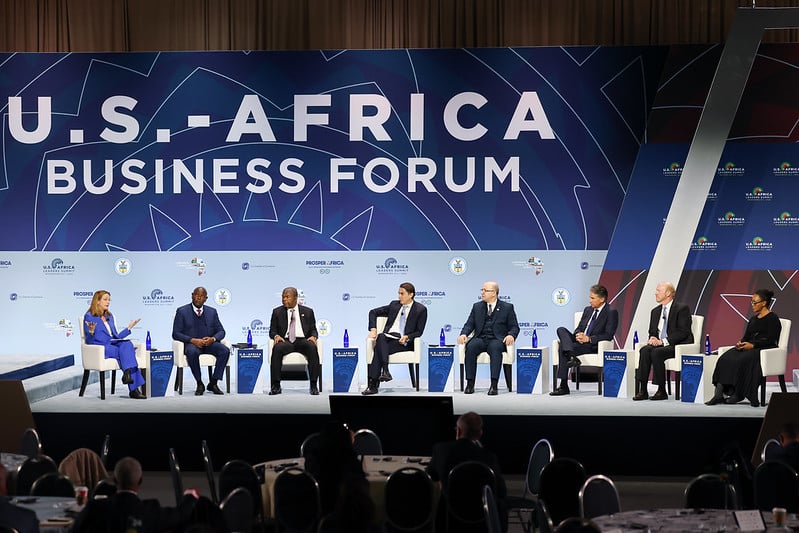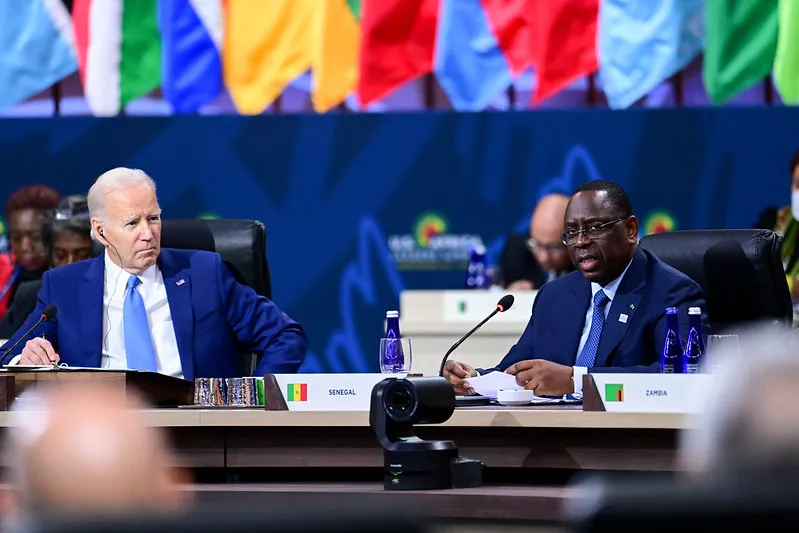The US-Africa Leaders Summit opened with the kind of fanfare on Tuesday that had onlookers wondering whether the conference would be a triumph of showmanship over substance. But the delegates were pleasantly surprised. A number of concrete achievements emerged, from US government and private sector investment deals, to a festive sleigh of new funding initiatives and bilateral meetings between African heads of state, development finance institutions and the US Departments of State and Commerce.
Here’s a roundup of the top business deals, announcements and highlights from the second US-Africa Leaders Summit.
Day 1 – Tuesday
Topping the agenda on Day 1 was a closed ministerial meeting on the feted African Growth and Opportunity Act (AGOA), a piece of legislation that grants African economies duty-free access to US markets.
The discussion evolved around the question of whether Congress will renew the treaty when it expires in 2025. The deal, which has been met with varied success, faces opposition from some industries, such as Africa’s poultry industry, which is reluctant to allow unfettered foreign competition.
“They have to take it [the AGOA renewal bill] to the Hill,” said a delegate from the Senegalese embassy to the United States, echoing the words of US officials.
“If they don’t extend AGOA beyond 2025, every country will need a trade deal,” he explained, speaking on the condition of anonymity.
Senegal hopes to launch energy exports to the US as its first gas export project nears completion, with talks launched that day for a potential bilateral trade deal in the event that AGOA was cancelled, he said.
Another highlight from Day 1 was the Peace, Security, and Governance Forum, where US secretary of state Anthony Blinken sat down with secretary of defense Lloyd Austin, USAID administrator Samantha Power and African Union Commission chairperson Moussa Faki Mahamat.
Up for discussion was the US desire to crack down on Russia supplying cheap arms and mercenaries on the continent, as well as the need for strong governance and stability following a series of coups across West Africa.
“It’s very hard to see our way out of security conundrums and economic difficulties without governance reform, and we have to be honest, the trends aren’t great,” Power told the panel discussion.
The first day of the conference was also marked by protests from Ethiopia’s diaspora Oromo community, with crowds slamming the arrival of Prime Minister Abiy Ahmed in the capital chanting “Abiy Ahmed is a killer!”
Day 2 – Wednesday
Day 2 was marked by a flurry of non-stop deals between the US and Africa, as part of the US-Africa Business Forum that dominated Day 2.
In an address to the summit, US President Joe Biden unveiled $5bn in investment projects on the conitnent.
“This forum is about building connections, its about closing deals, and above all its about the future. Our shared future.”
Biden revealed that the US is signing a “historic” agreement with the new African Continental Free Trade Area Secretariat.
“The MOU will unlock new opportunities for trade and investment between our countries and bring Africa and the United States even closer than ever,” he said, adding that the deal will enshrine protections for workers both across Africa and in the United States, and support SMEs, women-owned businesses, diaspora-owned businesses, and the continent’s fast-growing urban economies.
“We’re finally implementing the African Continental Free Trade Area,” he said, following claims that the US did not support the initiative for a regional free-trade zone.
The MOU was signed on Wednesday by Wamkele Mene, Secretary-General of AfCFTA, and US Trade Representative, Katherine Tai.
“We signed this MOU to create a platform for a regular dialogue with the AfCFTA Secretariat and other stakeholders to address matters of mutual interest about the negotiation and implementation of the AfCFTA,” Tai said following the signing.
In another landmark announcement on Day 2, the US government’s foreign aid agency, the Millennium Challenge Corporation, signed its first regional transport contract with the governments of Benin and Niger for a $500m investment in new roads and shipping routes from Benin’s main Port of Cotonou.
The US International Development Finance Corporation also announced an investment of nearly $370m in new projects.
“$100 million to increase the reliable clean energy for millions of people in Sub-Saharan Africa; $20 million to provide financing for fertilizer to help smallholder farmers, particularly women farmers, increase the yields of their crops; $10 million to support small- and medium-sized — small- and medium-sized enterprises that help bring clean drinking water to communities all across the continent,” Biden said.
Biden also rolled out a new Digital Transformation initiative with Africa, that will invest $350m to facilitate more than almost half a billion dollars in financing to strengthen internet access and skills across the continent.
That includes partnerships between Microsoft and Viasat to bring broadband to 5 million Africans, as well as training programs for African entrepreneurs, with a focus on women, to code and build skills that need to start their own businesses, and to secure top jobs with tech firms, Biden said.
“And this will include partnerships between Africa, American comp- — African and American companies to provide cybersecurity services to make sure Africa’s digital environment is reliable and secure.,” he added.

Top deals from the Prosper Africa Deal Room on Day 2
Kobold Metals and the Zambian Government – Zambian President Hakainde Hichilema appeared at the US-Africa Business Forum deal room to celebrate the announcement that Kobold Metals, a startup backed by Bill Gates’ Breakthrough Energy Ventures, will invest $150m to explore Zambian copper mines using AI. The deal has the potential to provide enough copper for more than 100 million electric vehicle batteries in a bid to cater to the global EV boom, a press statement said.
ABD Group and Acrow Bridge – The government of Angola is partnering with two American companies, ABD Group and Acrow Bridge, to build 186 steel bridges covering every territory in Angola. The first phase of the $371m project will start in early 2023.
Cisco Systems and Cybastion, a diaspora-owned small business, jointly announced $800m in new contracts to protect African countries from cyber threats.
Visa is committing more than $1bn into Africa over the next five years to expand its operations on the continent, including providing mobile payment services for more micro-, small-, and medium-sized businesses across.
General Electric and Standard Bank will also provide $80m to improve healthcare services across the continent and provide access to cutting-edge healthcare equipment.
Day 3 – Thursday
President Biden opened Day 3 with a panel discussion with Anthony Blinken, Macky Sall and Moussa Faki Mahamat, in which he stressed his support for Africa to join the G20 as a permanent member of the grouping of the world’s top 20 major economies.
“Its been a long in coming, but its going to come,” Biden promised.

Over the next three years, the US plans to pour £55bn into the continent to advance the priorities of agenda 2023, he continued.
In addition to those investments, Biden will be seeking permission from Congress to mobilise financing to help African economies climb out of debt and to support African recovery.
“I’m asking Congress for the authority to lend $21bn to the IMF to provide access to necessary financing for middle-income countries, as its so difficult to come by now.
Biden also unveiled a plan for countering democratic backsliding through a new African democratic and political transition initiative.
“Collaborating closely with African governments, regional institutions, and civil society, my administration will work with the United States Congress to invest $75 million to strengthen transparent, accountable governance; facilitate voter registration; support constitutional reform; and more,” Biden said.
The administration will also strengthen the security benefits that flow from good governance, with a new 21st Century Partnership for African Security.
“Through this three-year, $100-million-dollar pilot program, the Department of Defense will work with our African partners to boost reforms that build their security capacity,” he said.
In a panel discussion, Senegal’s president Macky Sall, speaking in his capacity as chairman of the African Union, outlined the continents six priorities in regards to their US relations:
- 1. Peace and security in the fight against terrorism in Africa, and for US backing in the UN Security Council to place Africa’s terrorism threat in the framework of the UN Charter’s Collective Security Mechanism, so it becomes part of the global struggle against terrorism.
- 2. Africa requests the allotment of Special Drawing Rights and the implementation in the G20 of debt relief as global shocks continue to leave many Africans unable to bear the cost of living.
- 3. Africa wishes a more sustained committement on investment in development infrastructure such as roads, railroads, electric plants and digital infrastructure.
- 4. Africa asks for an equitable green transition to satisfy its industrialisation needs and to ensure it can realise universal access to electricity.
- 5. Africa would like to work with the US to win the war against hunger. Africa would like urgent access to be taken to facilitate access to fertilisers. Sall proposed that the president launch an initiative at the executive level focussed on agriculture in Africa
- 6. Africa asks for a more inclusive and just world governance by accelerating the reforn of the security council and to give Africa a permanent seat at the UN.
Sall also called for the US to lift sanctions on Zimbabwe, insisting:
“Zimbabwe has been sanctioned since Mugabe’s time and I think its time to lift these sanctions so that Zimbabweans can continue to fight efficiently against development and poverty.
Want to continue reading? Subscribe today.
You've read all your free articles for this month! Subscribe now to enjoy full access to our content.
Digital Monthly
£8.00 / month
Receive full unlimited access to our articles, opinions, podcasts and more.
Digital Yearly
£70.00 / year
Our best value offer - save £26 and gain access to all of our digital content for an entire year!
 Sign in with Google
Sign in with Google 



